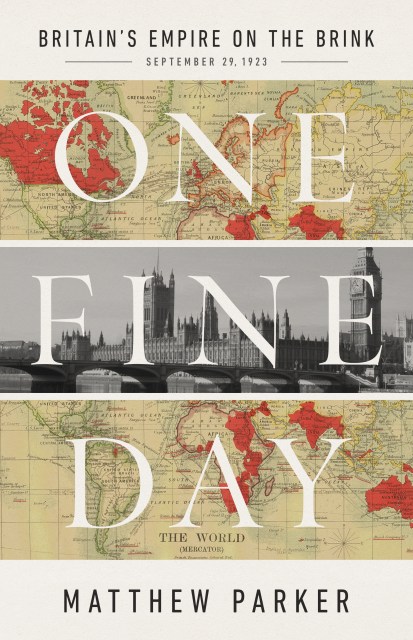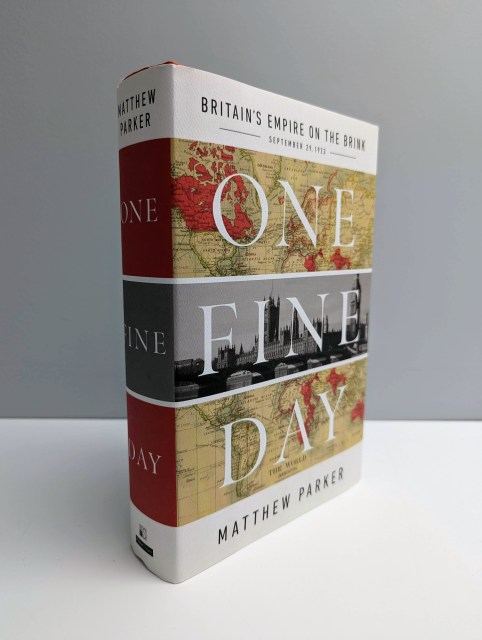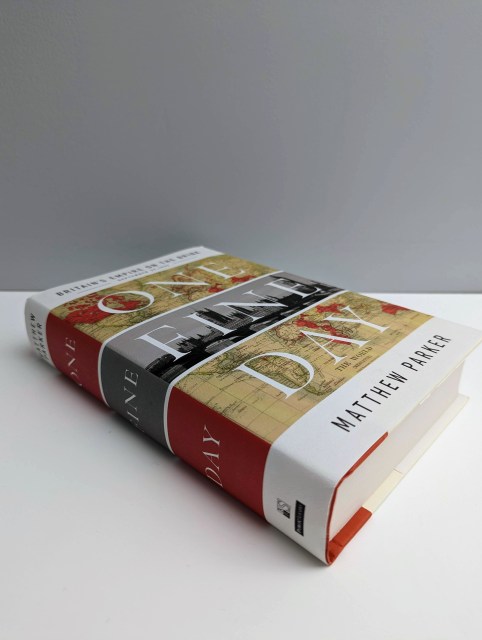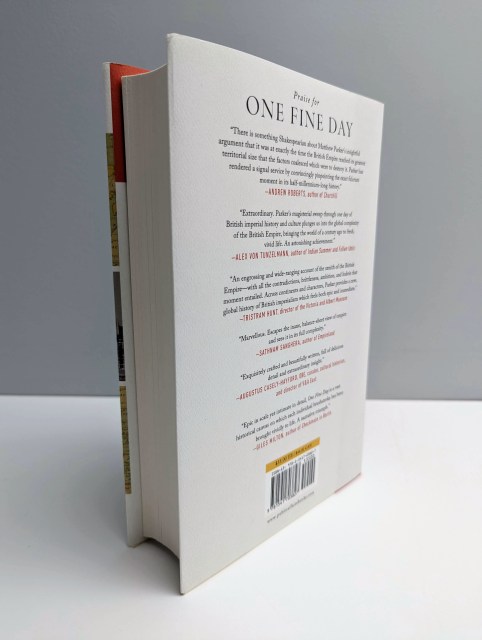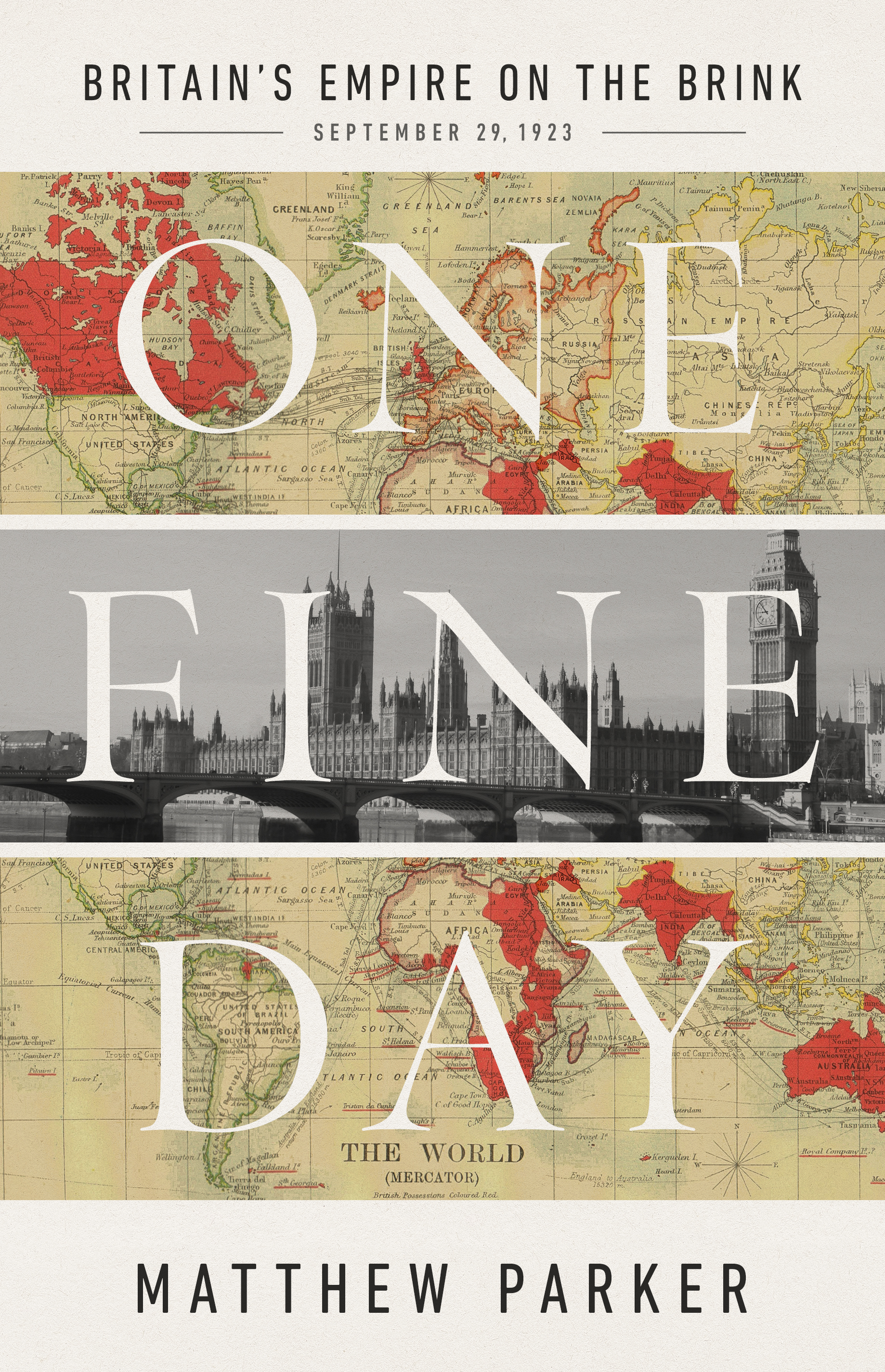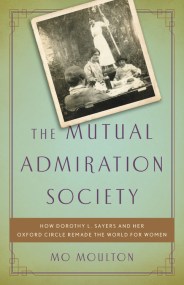By clicking “Accept,” you agree to the use of cookies and similar technologies on your device as set forth in our Cookie Policy and our Privacy Policy. Please note that certain cookies are essential for this website to function properly and do not require user consent to be deployed.
One Fine Day
Britain's Empire on the Brink
Contributors
Formats and Prices
Price
$35.00Price
$44.00 CADFormat
Format:
- Hardcover $35.00 $44.00 CAD
- ebook $19.99 $25.99 CAD
- Audiobook Download (Unabridged) $44.99
This item is a preorder. Your payment method will be charged immediately, and the product is expected to ship on or around September 26, 2023. This date is subject to change due to shipping delays beyond our control.
Also available from:
September 29, 1923. Once the Palestine Mandate officially takes effect, the British Empire—now covering a quarter of the world’s land and boasting a population of 460 million—is the largest the world has ever seen. But it is also an empire in rapid transition.
Nationalist and Pan-African movements are gaining momentum throughout West Africa, thanks as much to Marcus Garvey as to the sustained efforts of local activists and politicians.
On far-flung Ocean Island in the Pacific, highly profitable phosphate extraction threatens to render the land uninhabitable for its native population—and colonial officials are torn between their integrity and their careers.
And in India, Jawaharlal Nehru and fellow nationalists wonder despairingly about the future of the independence movement as Gandhi languishes in prison.
Moving from London to Kuala Lumpur, Australia to the West Indies, One Fine Day is a breathtaking and unflinching tour of the British Empire at its pinnacle. Here the Empire is at its biggest; but it is on a precipice, beset with debts and doubts as liberation movements emerge to undo the colonial era, and see the sun set on the Empire.
-
“A sprawling account of the British empire…The portrait is achieved with a wide-angled lens, but the choice of a single day also brings focus…What emerges is a picture of an empire straining under the weight of its own contradictions. The British thought of their role as an enlightened one: stopping tribal warfare and introducing modern health care and education. Yet they brought forced labour and colonial massacres, racist rules, and substandard health care and education. Rather than simply stating so baldly, Mr Parker points this out through copious examples and meticulous research. He appears to have read the front page of every newspaper published in the empire on that day.”The Economist
-
“Parker’s book provides far more than just an Anglo-centric perspective on the British Empire. His reading of numerous local writers and politicians, ranging from Jawaharlal Nehru in India to Marcus Garvey in Jamaica, gives One Fine Day the kaleidoscopic dimension of a Ken Burns documentary.”Air Mail
-
“His research is prodigious, his mastery of detail impeccable… Although Parker places considerable weight on the darker side of empire—the violence, the condescension, the repression—he never hectors the reader, allowing the stories to speak for themselves.”Sunday Times (UK)
-
“Brilliant…extraordinary… no attempt is made to shy away from the white supremacism at the core of the Empire’s mythology – but it also turns up glimpses of humanist benevolence and grand ambition. It is a book for serious people who can handle difficult moral contradictions, and will undoubtedly annoy zealots of all stripes.”The Telegraph (UK)
-
“A compelling read… Part of what makes this book such a fascinating read is that we all know what’s about to come, but since Parker sticks to his premise, we remain in a sense of suspense throughout.... The end of empire does not come at the end of One Fine Day, but we leave with a much clearer sense of why its demise, if not inevitable, was certainly impending.”The Observer (UK)
-
"What we have here is a fair appraisal of the lie of the land, elegantly synthesised and compressed. Parker is especially strong in his evocation of the ruling caste."The Times (UK)
-
“Without ever assuming the role of anti-imperialist preacher, [Parker] lets the words and deeds of the imperialists themselves reveal how far from glorious the real world of the British Empire was.”Irish Times
-
“Parker offers an eclectic collection of illuminating observations—people, places and attitudes. He avoids the strident debate about right and wrong, instead delivering a panorama of complexity, and allowing us to draw our own conclusions.”The Times (UK) best books of the year
-
“A panoramic view of the British Empire on September 29, 1923… Parker vividly demonstrates the empire’s vast reach and the ‘impossibly conflicting interests between government [and] the governed.’…Accessible and sturdy, this expansive account provides solid ground for understanding the decline of the British Empire. It’s an eye-opening and a unique vantage point from which to study 20th-century history.”Publishers Weekly
-
“An ambitious history of the beginning of the end of vast dominions of the British Empire on Sept. 29, 1923… a multilayered portrait, with deep contextual background…An impressive work of research and synthesis tracing the end of an empire.”Kirkus
-
“There is something Shakespearian about Matthew Parker’s insightful argument that it was at exactly the time the British Empire reached its greatest territorial size that the factors coalesced which were to destroy it. Whether you regard the British Empire as an overall boon—as I do—or as an abomination, Parker has rendered a signal service by convincingly pinpointing the exact fulcrum moment in its half-millennium-long history.”Andrew Roberts, author of Churchill
-
“Marvellous. Escapes the inane, balance-sheet view of empire and sees it in its full complexity.”Sathnam Sanghera, author of Empireland
-
“Extraordinary. Parker’s magisterial sweep through one day of British imperial history and culture plunges us into the global complexity of the British Empire, bringing the world of a century ago to fresh, vivid life. An astonishing achievement.”Alex von Tunzelmann, author of Indian Summer and Fallen Idols
-
“An engrossing and wide-ranging account of the zenith of the British Empire—with all the contradictions, brittleness, ambition and hubris that moment entailed. Across Continents and characters, Matthew Parker provides a new, global history of British imperialism which feels both epic and immediate.”Tristram Hunt, director of the Victoria and Albert Museum
-
“Exquisitely crafted and beautifully written, full of delicious detail and extraordinary insight.”Augustus Casely-Hayford, OBE, curator, cultural historian, and director of V&A East
- On Sale
- Sep 26, 2023
- Page Count
- 624 pages
- Publisher
- PublicAffairs
- ISBN-13
- 9781541703827
Newsletter Signup
By clicking ‘Sign Up,’ I acknowledge that I have read and agree to Hachette Book Group’s Privacy Policy and Terms of Use
